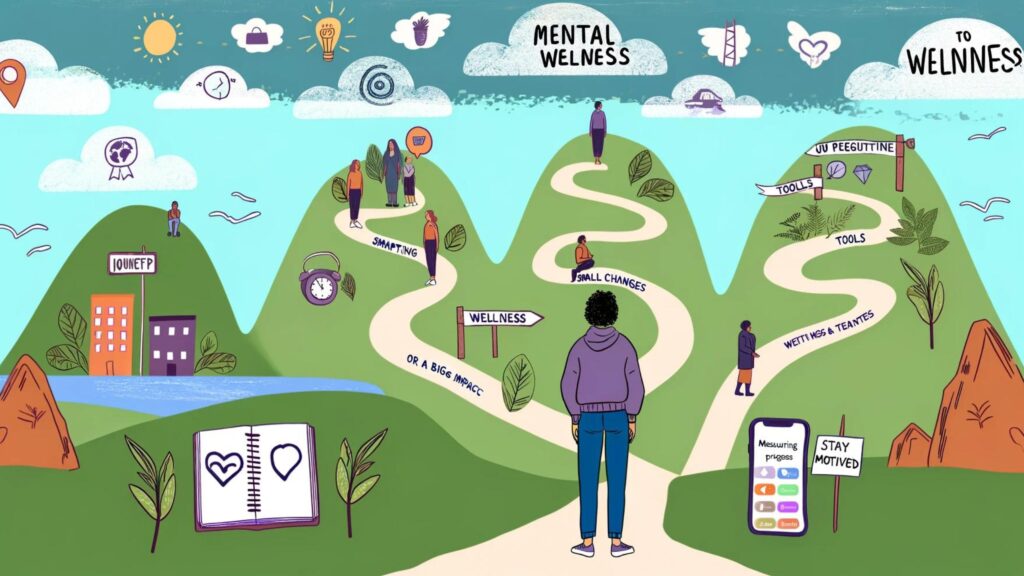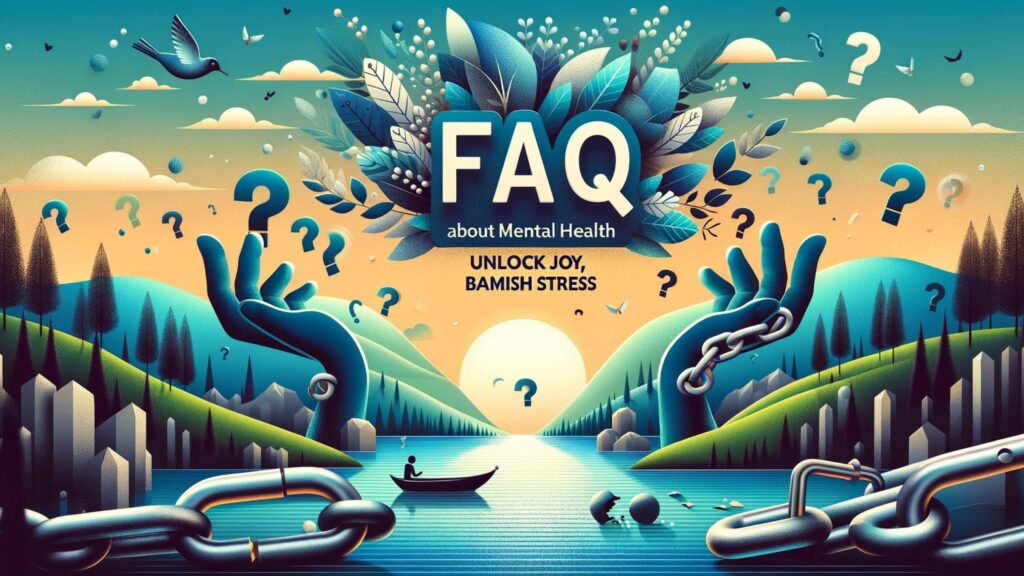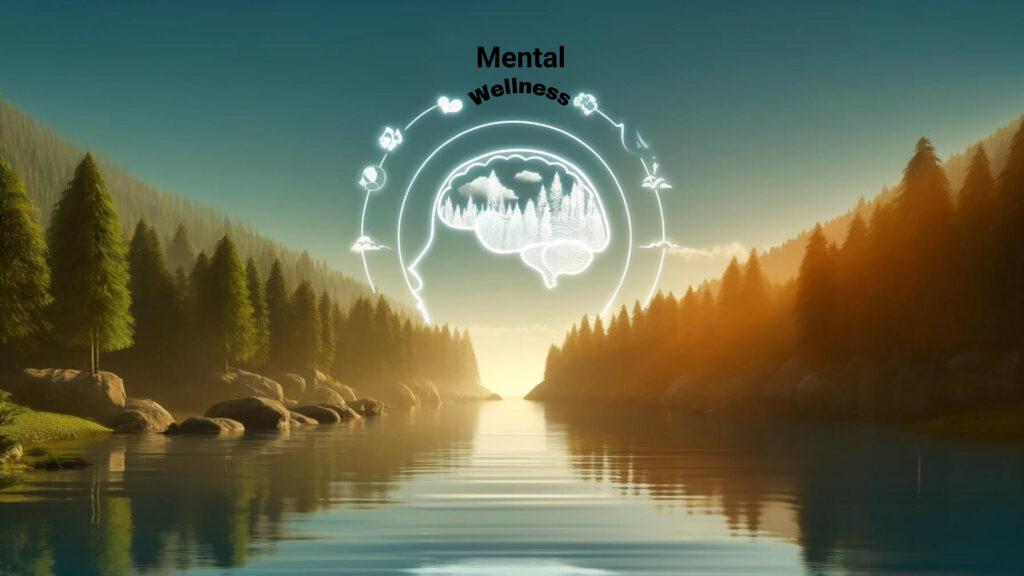Mental wellness offers hope in life’s challenges, guiding people to peace and balance. However, the path to achieving and maintaining this state is often mysterious, leaving many seeking serenity. What if the keys to lasting mental health were easier to find? This article shares the Top 5 Secrets to Everlasting Mental Wellness, gleaned from ancient wisdom and modern science. Every secret on the path to holistic health promises to make the ordinary extraordinary. Expect to be captivated by insights that challenge the status quo and offer a new paradigm for thriving in a changing world as you explore. Mental wellness is a shared human experience that offers growth, resilience, and transcendence.
- Introduction to Lifelong Mental Wellness Secrets
- The foundations of mental wellness
- Secret #1: Mindfulness Mastery
- Secret #2: Emotional Resilience
- Secret #3: The Power of Positive Connections
- Secret #4: Physical Health Integration.
- Secret #5: Integrating the Secrets into Your Life
- Common challenges and ways to overcome them
- The Five Secrets to Long-Lasting Mental Wellness: A Professional Guide
- Frequently Asked Questions: 5 Secrets to Everlasting Mental Wellness.
- Conclusion
Introduction to Lifelong Mental Wellness Secrets
The pursuit of mental wellness is a timeless quest.
The quest for mental wellness is as old as humanity itself—an ongoing effort to find balance amidst the chaos of life. Deeply ingrained in our collective psyche, this quest transcends cultures and epochs, reflecting a universal desire for inner calm and emotional stability.
Nonetheless, it is as relevant today as it was for our forefathers, demonstrating the timeless nature of our quest for mental peace. Navigating the complexities of modern life necessitates the pursuit of mental wellness, which is not only desirable but also required for a fulfilling and harmonious life.
Understanding the Foundation: What is Mental Wellness?
Mental wellness, at its core, represents a state of well-being in which an individual recognizes their own abilities, can cope with life’s normal stresses, can work productively and fruitfully, and can contribute to their community. It serves as the foundation for our thoughts, emotions, and behaviors, influencing how we perceive the world and our place in it.
Embracing mental wellness entails seeking balance, resilience, and a deep connection to oneself and others, thereby creating an environment conducive to growth and happiness.
The impact of mental wellness on daily life is significant.
Mental wellness has a wide-ranging impact on our decisions, relationships, and overall quality of life. When we are mentally healthy, we can face life’s challenges with grace, maintain positive relationships, and make meaningful contributions to society.
In contrast, when our mental health deteriorates, every aspect of our lives can seem impossible to manage. Achieving and maintaining mental wellness is thus not a luxury but rather a necessity, allowing us to live lives filled with joy, resilience, and purpose.
Deciphering the Secrets: A Peek into Everlasting Serenity.
Unveiling the secrets to long-term mental wellness is like discovering a hidden treasure map that leads us through uncharted territories of the mind and soul. These secrets, distilled from age-old wisdom and modern scientific advancements, provide practical strategies for promoting mental health.
Understanding these principles, which range from the art of mindfulness to the power of connection, illuminates the path to a life of peace and fulfillment. As we embark on this journey together, let us discover these timeless secrets, which will open the door to a realm of eternal mental wellness.

The foundations of mental wellness
Psychological Pillars of Mental Wellness
Several psychological pillars, or essential structures that support our inner equilibrium, are central to mental wellness. These qualities include self-awareness, resilience, empathy, and adaptability. Self-awareness enables us to comprehend our thoughts, feelings, and reactions, acting as a compass through which we navigate our emotional landscape.
Resilience, or the ability to recover from adversity, provides us with the strength to confront life’s challenges. Empathy brings us closer to others, fostering relationships based on understanding and compassion. Flexibility, or the ability to adapt to change, allows us to adjust our sails to the winds of life. These pillars serve as the foundation for mental wellness, with each element interlocking with the next to form a strong psychological health structure.
Emotional balance and mental wellness are inseparable.
Emotional balance is the foundation of mental health. It is the harmonious state in which our varied emotions coexist without overwhelming us. Achieving this balance is a delicate dance that requires us to be aware of our internal rhythms and disciplined in our reactions.
Emotional balance does not imply the absence of negative emotions; rather, it refers to the ability to move through them with grace and wisdom. This equilibrium allows us to experience life’s highs and lows with a steady heart, ensuring that our mental health remains intact amidst the turmoil of our emotions.
The Physical Connection: How Your Body Influences Mental Health
Our bodies and minds are not distinct entities but rather intertwined aspects of our being. Our physical health has a direct impact on our mental health, and both influence each other in a continuous feedback loop. Regular physical activity releases endorphins, the body’s natural mood lifters, while a well-balanced diet provides the nutrients necessary for brain health.
Sleep also plays an important role, with its restorative properties influencing everything from mood regulation to cognitive function. Caring for our bodies nurtures our minds, emphasizing the undeniable link between physical and mental health.
Nurturing Your Mental Garden: Secrets for Cultivating a Healthy Mind
Just as a garden requires care to thrive, so does our mental landscape. Cultivating a healthy mind necessitates consistent maintenance and deliberate sowing of positive thoughts and behaviors. Mindfulness practices, such as meditation and deep breathing, help to eliminate stress and anxiety, allowing peace and clarity to flourish.
Learning new skills and hobbies improves our mental soil, fostering growth and resilience. Positive affirmations and self-compassion are like sunlight and water for our inner garden, encouraging us to bloom. By devoting time and effort to mental cultivation, we can achieve a state of wellness that will see us through all stages of life.

Secret #1: Mindfulness Mastery
The importance of mindfulness in mental wellness is crucial.
Mindfulness, or the practice of being fully present and engaged in the moment, is a foundational component of mental health. Its essence is to cultivate an awareness of our thoughts, emotions, and sensations without judgment. This practice keeps us grounded in the present moment, allowing us to connect deeply with ourselves and our surroundings.
Mindfulness clears the fog of distraction and automaticity, revealing the richness of daily life. It teaches us to accept life’s unpredictability with calmness, changing how we perceive our existence. By embracing mindfulness, we can live in a more attentive, compassionate, and fulfilled way.
Mindfulness Techniques: Breathing, Meditation, and Other Practices
Mastering mindfulness is a journey that starts with simple but profound techniques. Breath awareness is the first step toward mindfulness, a practice in which one focuses on the natural rhythm of inhalation and exhalation, anchoring the mind in the present. Meditation deepens this practice by allowing us to observe our thoughts and feelings without becoming entangled.
Body scans are a technique that improves our connection to physical sensations, promoting a holistic sense of well-being. Walking and eating mindfully transform daily activities into rituals of presence. These practices, when integrated into daily life, provide the foundation for a more mindful existence.
Daily mindfulness habits to improve mental wellness
Incorporating mindfulness into our daily routines can significantly improve our mental health. Beginning the day with a few minutes of meditation creates a sense of calm and intention. Taking mindful breathing breaks throughout the day can help us reset and focus our energy. Practicing gratitude, or acknowledging the good things in our lives, promotes a positive mindset.
Engaging fully in tasks, whether at work or leisure, enriches our experiences while reducing stress. Ending the day by reflecting on moments of mindfulness strengthens the habit. These seemingly insignificant daily practices add up to create a profound sense of mental well-being.
Overcoming Barriers to Mindfulness: Common Challenges and Solutions
While mindfulness has numerous benefits, it is not without challenges. Distractions, skepticism, and frustration can all impede our mindfulness practice. Patience and persistence are essential for overcoming these barriers. Recognizing that distraction is a normal part of the process allows us to gently refocus our attention without judgment.
Exploring mindfulness through various practices can help reduce skepticism as we discover what resonates with us individually. Finally, setting realistic expectations and celebrating small victories can help to alleviate frustration by reminding us that mindfulness is a skill that requires practice. With understanding and dedication, the path to mindfulness mastery becomes clear and manageable.

Secret #2: Emotional Resilience
Define emotional resilience in the field of mental wellness.
Emotional resilience is the remarkable ability to adapt to stress and adversity while remaining psychologically healthy. Within the realm of mental wellness, it serves as a buffer against life’s storms, allowing people to emerge from challenges not only unscathed but also strengthened. This resilience is not an innate trait bestowed on a select few, but rather a skill that can be developed and nurtured.
It entails the ability to confront despair, harness inner strengths, and recover with greater vigor. Emotional resilience is the foundation of a strong mental health framework, allowing people to navigate the ups and downs of life with grace and determination.
Strategies for Developing Unshakeable Emotional Strength
Developing unshakeable emotional strength is similar to building a fortress around one’s well-being, and several strategies can help. Mindfulness and self-awareness serve as the foundation for emotional recognition and management. Developing a positive mindset shifts the focus away from problems and toward solutions, instilling hope rather than despair.
Establishing a self-care routine fosters physical health, a crucial component of emotional resilience. Building a support network serves as a safety net, offering encouragement and perspective during difficult times. Together, these strategies form a tapestry of resilience that can withstand life’s pressures.
The importance of positive relationships in building resilience
Positive relationships serve as a framework for emotional resilience, providing support, understanding, and love. These bonds, whether with family, friends, or community members, provide a sense of belonging and acceptance, which is especially important during difficult times. They provide a sounding board for our fears and frustrations, allowing for emotional release and the exchange of different points of view.
These relationships provide encouragement that enhances self-esteem and strengthens resolve. In essence, positive relationships do more than just support resilience; they are the very essence of it, emphasizing the interdependence of human connections in our quest for mental health.
Learning from Loss: Resilience Secrets to Bouncing Back
Loss, an unavoidable part of the human experience, poses significant challenges to our emotional resilience. However, this adversity has the potential for significant personal growth. Learning from loss entails embracing the pain, accepting it as part of life’s tapestry, and drawing insights from the experience.
It requires acknowledging that resilience is about bravely traversing the valley of despair rather than avoiding it. Reframing the experience to emphasize learned lessons and strengths can turn loss into a catalyst for resilience. Individuals who apply these secrets can regain emotional equilibrium, armed with deeper wisdom and a reenergized spirit.

Secret #3: The Power of Positive Connections
Social Wellness: A Keystone to Mental Health
Social wellness, an often-overlooked component of mental health, is critical to our overall well-being. It entails developing and maintaining healthy, fulfilling relationships, as well as feeling connected to a larger community.
This aspect of wellness focuses on balancing the give-and-take of human interactions, developing empathy, and forming bonds that provide support and joy. Social wellness encourages us to form relationships that enrich our lives and provide a buffer against life’s stressors. It is the glue that holds people together in society, providing a sense of belonging and contributing to a strong mental health framework.
Developing Meaningful Relationships: Tips and Secrets
The art of cultivating meaningful relationships is similar to gardening; it takes patience, care, and the right environment to thrive. Begin by being present and genuinely interested in others, actively listening and empathizing. Express your appreciation and gratitude, acknowledging the value that others bring into your life. Establish healthy boundaries to promote mutual respect and understanding.
Participate in activities that promote connection, such as common hobbies or community service. Remember that the quality of relationships far outweighs the quantity. Nurturing these connections sows the seeds of long-term bonds that benefit both you and those around you.
Navigating the Digital Age: The Effects of Social Media on Mental Health
In the digital age, social media has a double-edged effect on mental health. On the one hand, it connects us to friends, family, and communities around the world. On the other hand, it can promote comparison, isolation, and cyberbullying. Use social media wisely to maximize its benefits while minimizing its drawbacks.
Set boundaries for your online time, curate your feed with positive and inspiring content, and prioritize in-person interactions. Remember that the virtual world should supplement, not replace, real-life interactions. In the digital age, we can protect our mental health by intentionally using social media.
Creating a Supportive Community: Secrets for Finding Your Tribe
Finding your tribe, a supportive community that shares your values and interests, is critical to mental health. Begin by exploring your passions and interests, then join clubs, groups, or online communities that share them. Be open to making new connections in unexpected places, and take the initiative to reach out and interact with others.
Create spaces that promote openness, acceptance, and mutual support. Remember, a sense of community can be found anywhere, including in the workplace, hobby groups, and online platforms. By actively seeking and nurturing these connections, you can build a network of support that will help you maintain your mental health and provide both strength and solace on your journey through life.
- Introduction to Lifelong Mental Wellness Secrets
- The foundations of mental wellness
- Secret #1: Mindfulness Mastery
- Secret #2: Emotional Resilience
- Secret #3: The Power of Positive Connections
- Secret #4: Physical Health Integration.
- Secret #5: Integrating the Secrets into Your Life
- Common challenges and ways to overcome them
- The Five Secrets to Long-Lasting Mental Wellness: A Professional Guide
- Frequently Asked Questions: 5 Secrets to Everlasting Mental Wellness.
- Conclusion

Secret #4: Physical Health Integration.
The Undeniable Relationship Between Physical Activity and Mental Health
The symbiotic relationship between physical activity and mental health is well documented but astonishingly profound. Regular exercise not only sculpts the body but also strengthens the mind by acting as a catalyst for the release of endorphins, which are often referred to as nature’s mood-lifters. This biochemical cascade induces feelings of euphoria and tranquility, thereby alleviating depression and anxiety.
Physical activity improves cognitive function, self-esteem, and sleep quality, making it a necessary component of mental health. By incorporating physical activity into our daily routines, we gain a valuable ally in our quest for emotional and psychological balance.
Nutritional Secrets to a Healthy Mind
The adage “You are what you eat” is especially relevant when it comes to mental health. Nutritional psychiatry has emerged as a compelling field, emphasizing the importance of dietary choices for mental health. Omega-3 fatty acids, found in fish, flaxseed, and walnuts, are essential for brain health, boosting mood and cognitive function.
Antioxidant-rich fruits and vegetables help to combat oxidative stress, which contributes to mood disorders. Whole grains contain complex carbohydrates that provide a steady supply of glucose to the brain, increasing alertness and concentration. By carefully curating our diets to include these nutritional powerhouses, we nourish not only our bodies but also our minds, paving the way for better mental health.
The Importance of Rest: Sleep’s Role in Mental Wellness.
Sleep, the unsung hero of mental health, is essential for emotional and cognitive processing. During the deep stages of sleep, our brains engage in activities critical for memory consolidation, problem solving, and emotional regulation.
Chronic sleep deprivation can result in a variety of mental health issues, including irritability, cognitive impairment, and an increased risk of depression. Establishing a consistent sleep schedule, creating a relaxing environment, and practicing pre-sleep rituals can all help to improve sleep quality. By prioritizing rest, we prepare our minds to face the challenges of the day with renewed vigor and clarity.
Overcoming Obstacles: Maintaining Physical Activity for Mental Health.
Despite the obvious benefits, sticking to a consistent physical activity regimen can be difficult due to time constraints, a lack of motivation, or physical limitations. The solution is to set realistic goals, find enjoyable activities, and incorporate movement into daily life in simple ways, such as taking the stairs instead of the elevator or engaging in short, high-intensity workouts.
Low-impact exercises like yoga, swimming, or walking can also be beneficial for those with physical limitations. The key is to think of physical activity as a privilege, not a chore, and as an opportunity to improve not only our physical health but also our mental health. By taking a flexible, compassionate approach, we can overcome these challenges and make physical health a joyful and integral part of our mental wellness journey.

Secret #5: Integrating the Secrets into Your Life
Developing a personalized mental wellness plan
The journey to mental wellness begins with creating a personalized plan based on your changes, needs, circumstances, and goals. This plan acts as a road map, guiding you through the complexities of maintaining your mental health. Begin by assessing your current level of wellness, identifying areas for improvement, and setting realistic, measurable goals.
Incorporate a well-balanced mix of physical activity, mindfulness practices, and social connections, tailoring them to your specific interests to ensure they resonate deeply with you. Regular reflection and adjustment ensure that the plan remains relevant and effective, adapting to your changing path toward mental wellness.
Small Changes, Big Impact: integrating the secrets into the Curriculum
The subtle impact of small, daily changes, rather than grand gestures, marks the path to mental wellness.ly changes. These small changes serve as the foundation for major transformations. Add mindfulness to your morning routine to set a positive tone for the day.
Replace sedentary habits with simple physical activities, such as a brisk walk or a quick yoga session. Cultivate positivity by expressing gratitude and making meaningful connections with others. Even the smallest change in perspective or behavior can have a positive ripple effect on your mental wellness landscape.
Tools and Techniques for Tracking Mental Health: Measuring Your Progress
Tracking your mental wellness journey is critical for recognizing progress, identifying areas for improvement, and staying motivated. Use journals to reflect on your daily emotions, thoughts, and experiences, gaining insight into patterns and triggers.
Apps and digital tools provide structured tracking of habits, mood changes, and self-care activities, allowing for real-time adjustments to your wellness plan. Regularly reviewing your progress with these tools promotes a sense of accomplishment and clarity, illuminating the path forward and emphasizing the significance of your mental health journey.
Staying Motivated: How to Continue Moving Forward in Your Mental Wellness Journey
Maintaining momentum in your mental health journey necessitates a reservoir of motivation, particularly when confronted with setbacks or slow progress. Anchor your motivation to the deeply personal reasons that led you down this path. Celebrate each victory, no matter how small, to foster a sense of accomplishment and progress.
Seek inspiration from stories of perseverance, and surround yourself with a supportive community that encourages and lifts you. Remind yourself that the journey to mental wellness is a marathon, not a sprint, and that it requires patience, perseverance, and self-compassion. By remaining committed to your goals and acknowledging the transformative power of this journey, you can ensure that your steps toward mental wellness are as rewarding as the destination itself.

Common challenges and ways to overcome them
Navigating Mental Wellness Obstacles
Mental wellness, like a journey through a labyrinth, has numerous roadblocks that can impede progress. These challenges, whether caused by external circumstances or internal struggles, can feel insurmountable. However, the key to overcoming these obstacles is to embrace flexibility and a problem-solving mindset. Identifying specific barriers to mental wellness allows for more targeted strategies, such as setting smaller, more manageable goals or modifying routines to incorporate self-care practices.
Mindfulness and meditation can also provide clarity, allowing you to navigate the maze of mental health with patience and perseverance. Viewing each roadblock as an opportunity for growth fosters resilience, transforming challenges into stepping stones to better mental health.
Dealing with setbacks: resilience and recovery secrets
Setbacks on the path to mental health are not only common but also an essential part of the development process. They put our resilience to the test, pushing us to be stronger and more determined. The key to dealing with setbacks is to accept them as natural, learn from each experience, and adapt our strategies accordingly. It is critical to practice self-compassion, understanding that progress is not linear and that patience with oneself is essential.
Setting realistic expectations and celebrating small victories fosters resilience, reinforcing faith in our ability to recover. Furthermore, maintaining a support network serves as a safety net, providing encouragement and perspective when faced with setbacks. Embracing these principles ensures that each setback serves as a springboard for renewed effort and insight.
Seeking Help: When and How to Find Professional Support.
Recognizing the need for help is an important step toward mental health, but many people are hesitant due to stigma or uncertainty. Recognizing the signs that indicate the need for professional help—such as persistent sadness, anxiety, or detachment—is critical. The process of seeking help begins with research, which includes exploring therapy options, learning about different mental health professionals, and determining which approach best suits your needs.
Consultations with reputable healthcare providers can provide information and referrals. Furthermore, many resources and support groups are available online, offering a starting point for those seeking assistance. Remember that seeking professional help is a sign of strength and a positive step toward regaining your mental health.

The Five Secrets to Long-Lasting Mental Wellness: A Professional Guide
Achieving and maintaining mental well-being is a multifaceted journey that requires consistent practice and dedication. Here is a step-by-step guide to understanding and implementing the five key secrets to long-term mental wellness:
1. Developing mindfulness
Step 1: Start every day with a mindfulness meditation. Sit quietly for 10 minutes and concentrate on your breath. This helps to establish a calm, present mindset throughout the day.
Step 2: Incorporate mindful moments throughout the day. Before beginning a new task, take a few deep breaths and center yourself to ensure you are completely present.
Step 3: Wrap up your day by reflecting on what moments you were fully engaged in and which ones your mind wandered through. This awareness improves your mindfulness skills.
2. Developing emotional resilience.
Step 1: Recognize your emotional triggers and acknowledge them without judgment. Understanding what influences your emotions is essential for managing reactions.
Step 2: Create coping strategies such as journaling, talking to a friend, or pursuing a hobby. These activities can help you manage stress and recover from emotional setbacks.
Step 3: Schedule regular time to engage in resilience-building activities such as physical exercise or creative projects that improve your mood and reduce anxiety.
3. Fostering strong connections.
Step 1: Make an effort to strengthen your relationships with family and friends by scheduling regular interactions, whether in person or virtually.
Step 2: Participate in community activities or groups that are relevant to your interests. This not only broadens your social circle but also boosts your sense of belonging.
Step 3: Offer help to others. Helping others can improve your mood and foster stronger relationships.
4. Maintaining physical health.
Step 1: Eat a healthy diet high in nutrients that promote brain health, such as omega-3 fatty acids, antioxidants, and vitamins.
Step 2: Include physical activity in your daily routine. Aim for 30 minutes of moderate exercise most days of the week.
Step 3: Prioritize your sleep. Aim for 7-9 hours per night and create a relaxing bedtime routine to improve sleep quality.
5. Pursuing continuous personal growth.
Step 1: Set personal development goals that are challenging but attainable. Divide these into small, manageable milestones.
Step 2: Seek out new learning opportunities, such as online courses, workshops, or books, to broaden your knowledge and skills.
Step 3: Regularly evaluate your progress. Take some time to consider what new things you’ve learned and where you can improve.
By diligently following these steps, you can build a strong foundation for long-term mental health. Each secret builds on the previous one, resulting in a comprehensive approach to not only maintaining mental health but thriving in all aspects of life.

Frequently Asked Questions: 5 Secrets to Everlasting Mental Wellness.
1. What are the “5 Secrets to Everlasting Mental Wellness”?
The “5 Secrets to Everlasting Mental Wellness” include cultivating mindfulness, developing emotional resilience, fostering strong relationships, maintaining physical health, and pursuing ongoing personal development. These principles represent a comprehensive approach to improving and maintaining mental health over time.
2. How can mindfulness improve mental health?
Mindfulness promotes mental health by helping people maintain their presence and awareness in their daily lives. This practice reduces stress, improves emotional reactions, and boosts overall health by allowing people to respond to life’s challenges more calmly and thoughtfully.
3. Why is emotional resilience necessary for mental health?
Emotional resilience is important because it allows people to adapt to stress and recover from adversity without having long-term negative consequences for their mental health. Building resilience through strategies such as coping mechanisms and understanding emotional triggers is critical for achieving stability and well-being.
4. How do strong connections promote mental health?
Strong social connections are essential for mental health because they provide emotional support, alleviate loneliness, and boost feelings of belonging and purpose. Connecting with supportive friends, family, and community members can lift one’s spirits and provide relief during times of stress or sadness.
5. What role does physical health have in promoting mental health?
Physical health has a significant impact on mental wellness. Regular exercise releases endorphins, which are natural mood enhancers. A healthy diet provides the nutrients needed for brain function, and adequate sleep aids emotional and psychological recovery, all of which contribute to overall mental health.
6. How does pursuing continuous personal growth relate to mental wellness?
Continuous personal development promotes lifelong learning and self-improvement, which keeps the mind engaged and active. Setting and achieving personal goals not only boosts self-esteem and satisfaction, but it also helps people adapt to new situations and challenges, which promotes mental health.
7. How often should I participate in activities that promote mental health?
Activities that promote mental wellness should be a regular part of your daily schedule. Daily practices such as mindfulness, physical activity, and social interaction can have a significant impact on your overall mental health. You can schedule personal growth activities as opportunities present themselves, but it’s crucial to regularly reflect on your personal development, either weekly or monthly.
Conclusion
Mental wellness is essential, and learning the 5 Secrets to Everlasting Mental Wellness enables people to navigate life’s complexities with grace. Accept these strategies to transform your mental health journey, fostering resilience, connection, and personal growth, resulting in a more balanced and fulfilling life. Discover more about improving your mental health in our related posts here. Dive deeper today!


